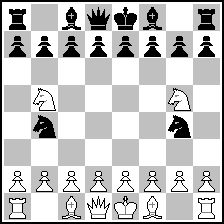
Website founded by
Milan Velimirović
in 2006
4:35 UTC


| |
MatPlus.Net  Forum Forum  General General  Interesting Experience with a Proof Game Interesting Experience with a Proof Game |
| |
|
|
|
|
You can only view this page!
| | | (1) Posted by Bob Baker [Saturday, Nov 18, 2023 16:11] | Interesting Experience with a Proof Game
In the Shortest-proof-game Challenge topic of the Fun With Chess forum at chess.com, Leither123 recently posted a position which he claimed had four SPGs that could be considered unique in a certain sense. I challenged the claim since, after giving the position to Stelvio 1.6, I received the result "Found 2 solutions. The problem is correct."
I asked Leither to reveal his solutions and when he did, I found that the position indeed has exactly four SPGs, one without castling, one with castling by White, one with castling by Black, and one with castling by both sides. I reported Stelvio's result, and Reto Aschwanden replied that I had found a bug in Stelvio, which he has fixed, and a new Stelvio version will be available in January with this fix included.
Leither's PG in 9.5 position is rnb2bqr/pppppp1k/5p1n/7p/4N3/1PP5/PKQPPPPP/R4BNR
| | | (2) Posted by Geoff Foster [Saturday, Nov 18, 2023 22:53] |
 (= 15+16 ) (= 15+16 )
| | | (3) Posted by Hauke Reddmann [Sunday, Nov 19, 2023 17:29] |
Note that the White and Black alternatives "commute".
I bet 4 SPGs where this is not the case will be MUCH harder
(and I'll rate this higher even if the game is much longer -
I guess a length record was also attempted?)
| | | (4) Posted by Joost de Heer [Sunday, Nov 19, 2023 20:40] |
It feels more like a full join of two dualistic maneuvres (OOO/Kb2/Ra1 + Kd1/Kc1/Kb2 and OO/Kh7/Rh8 + Kf8/Kg8/Kh7) than 4 solutions.
See also for instance https://pdb.dieschwalbe.de/P1000617 (if I would publish it now, I'd probably choose the stipulation 'shortest proof game with a) white to move b) black to move')
| | | (5) Posted by Mark Kirtley [Tuesday, Nov 21, 2023 03:43] |
That problem above, what I would stipulate as pg 9.5 with 4 variations, made me wonder if it could be stipulated using "multiplicative notation" in a single line, as in 1.1.4.1..., or 2.2.1.1...
I looked at the games that satisfy the problem, using Jacobi (Jacobi calls them "solutions"). Here they are:
1.b3 h5 2.Bb2 Sh6 3.Bf6 gxf6 4.Sc3 Bg7 5.Se4 Kf8 6.c3 Kg8 7.Qc2 Kh7 8.Kd1 Qg8 9.Kc1 Bf8 10.Kb2
1.b3 h5 2.Bb2 Sh6 3.Bf6 gxf6 4.Sc3 Bg7 5.Se4 Kf8 6.c3 Kg8 7.Qc2 Kh7 8.O-O-O Qg8 9.Kb2 Bf8 10.Ra1
1.b3 h5 2.Bb2 Sh6 3.Bf6 gxf6 4.Sc3 Bg7 5.Se4 O-O 6.c3 Kh7 7.Qc2 Rh8 8.Kd1 Qg8 9.Kc1 Bf8 10.Kb2
1.b3 h5 2.Bb2 Sh6 3.Bf6 gxf6 4.Sc3 Bg7 5.Se4 O-O 6.c3 Kh7 7.Qc2 Rh8 8.O-O-O Qg8 9.Kb2 Bf8 10.Ra1
Notice this could be stipulated, pg 9.5, 1.1.1.1.1.1.1.1.1.2.1.1.1.1.2.1.1.1.1 (not that you would care to, necessarily!)
And notice it cannot simply be stipulated, pg 9.5, 4 variations after White's fifth move.
Not all proof game problems have a one-line multiplicative stipulation possiblity, of course. Just think of the fascinating works of Noam Elkies each New Years!
It occurred to me to try a few questions about which can, and which cannot. Just to share, here's two positions I thought about.
 (= 16+16 ) (= 16+16 )
pg 2.0
 (= 16+16 ) (= 16+16 )
pg 4.0
In each case, can the number of games satisfying the stipulation be written as one multiplicative line? The second one is not so easy to answer -- at least it didn't come easy to me. Jacobi can easily check your anwer.
| | | (6) Posted by Hauke Reddmann [Tuesday, Nov 21, 2023 09:46] |
In math notation, this is fairly easy:
Symmetrize over the move orders and tensor product over the rest :-)
LaTeX otimes and odot will be your friend, see
https://en.wikipedia.org/wiki/Symmetric_tensor
| | | (7) Posted by Mark Kirtley [Saturday, Nov 25, 2023 04:33] |
Hauke, I like your humor. I did check out that website on tensor products and got frightened... :)
Here's the answers to those two questions I posed.
The pg 2.0 stipulation can be written 4.1.1.1 of course.
The pg 4.0 stipulation can be written 4.4.3.3.2.2.1.1 which is 576 solutions or games that solve the stipulation.
Does anyone know the history behind this sort of "multiplicative" notation? I know that in some countries the dot or period is used as a multiplication symbol, so I assume that's what it means. Is this correct? I notice that in Die Schwalbe and Probleemblad each Black-and-White pair is separated by a semicolon instead of a dot, so the pg 2.0 above would be written 4.1;1.1
In the FIDE Album I have, 2013-2015, the helpmates with multiple solutions have an extra dot at the end, as in 4.1.1.1.
This extra dot seems like a misplaced multiplication symbol to me...
| |
No more posts |
MatPlus.Net  Forum Forum  General General  Interesting Experience with a Proof Game Interesting Experience with a Proof Game |
|
|
|
 ISC 2025
ISC 2025 Forum
Forum  General
General  Interesting Experience with a Proof Game
Interesting Experience with a Proof Game 


